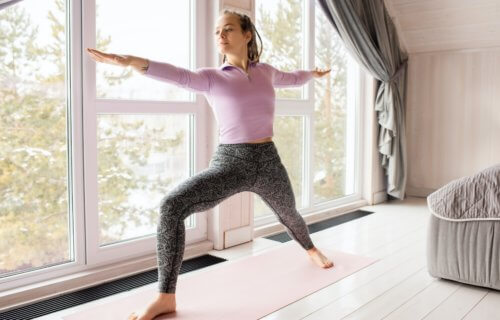NEW BRUNSWICK, N.J. — Can you reach Zen and have a healthy bladder at the same time? A recent study reviewing the health benefits of the “Yoga of Immortals” app argues it can. Researchers at Rutgers University found that people dealing with a loss of bladder control saw a significant improvement in their condition after using the app for four weeks.
Loss of urine control, also known as urinary incontinence, is more common among women than men. About 25 to 45 percent of women experience the condition which can dampen a person’s quality of life and impair their social, psychological, and sexual functioning. Despite the high prevalence rate, less than one in five people seek out treatment — ranging from medication, pelvic floor muscle physical therapy, or surgical procedures.
“Although these treatments are effective, there are many shortcomings: Medications have poor compliance and potential significant side effects; patients often lack the knowledge to identify specific pelvic muscles and motivation to complete physical therapy and the surgical procedures are invasive with potential complications,” says lead author Hari Tunuguntla, an associate professor of urological surgery at Rutgers’ Robert Wood Johnson Medical School, in a university release.
Tunuguntla says taking 30 minutes out of your day to use the app is an effective alternative because it’s safe and convenient. Having it on your phone makes it easy to get help without having to see a doctor in-person.
How does the app work?
Yoga of Immortals uses video and audio instruction for specific breathing exercises that engage the pelvic floor, stimulate energy centers for urinary control, and promote relaxation and alignment techniques for better muscle control. Other features include breathwork to enhance detoxification, mindfulness, and meditation. Past research on the app associated it with an enhancement in mental health and a person’s quality of life.
The team sent survey requests to app subscribers who experienced a loss of bladder control from not being able to reach the restroom in time or lost control when sneezing, coughing, or laughing. The 258 app users from 23 countries between 18 and 74 years-old — most being women — completed questionnaires at the four-week and eight-week marks — reporting on any improvements in their condition.
After four weeks, 76 percent of survey takers saw an improvement in the frequency and severity of urine leaks without having to visit a doctor. Most continued to see improvements after two months. People with the most severe leakage showed the most improvement in daily life activity and quality of life, rating themselves as “much better” by the end of the study. Based on the findings, the study authors suggest the app could successfully compliment ongoing treatments or increase adherence to treatment.
“Due to its convenience, flexibility and efficacy, the app may increase access to care and serve as first-line treatment for both women and men with urinary incontinence. This is an easily accessible, self-management treatment,” explains Tunuguntla. “However, further studies are needed to test the app’s efficacy in improving this condition long term.”
The study is published in the journal Urology.

